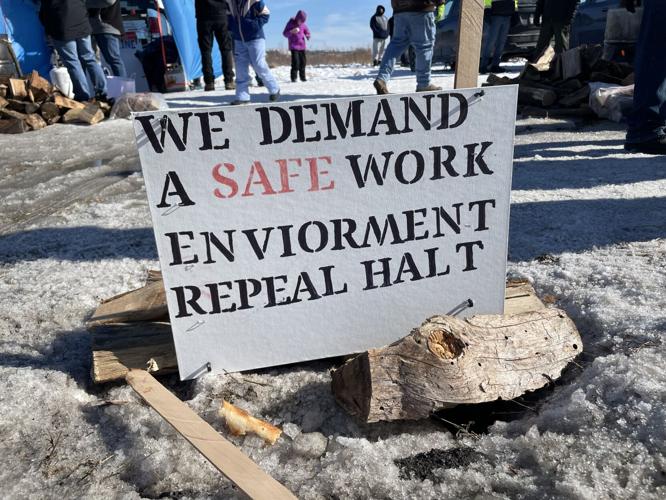COXSACKIE — Gov. Kathy Hochul deployed National Guard troops Wednesday to secure state-run prisons amid a wildcat strike by corrections workers.
Picketing and striking by corrections officers took place at around 30 state prisons, including at Coxsackie Correctional and Greene Correctional facilities, as of Wednesday morning, union officials said.
National Guard troops were deployed Wednesday, Hochul said, but she did not immediately specify where.
“They’ve already been deployed and are ready to stabilize the situation,” Hochul said of the National Guard soldiers in a video address released Wednesday. “I am directing everyone involved in these unlawful strikes to stop these actions immediately. Legal action has already commenced to ensure compliance.”
By Wednesday afternoon, about 150 striking employees and some supporters from both Greene and Coxsackie Correctional facilities took to the streets to strike over what they claim are unsafe working conditions at the two state prisons.
The strikers were predominantly active correction officers and other employees, while some on the picket lines were retired employees, and others were there to support family members who work in the facilities.
James Miller, public relations director for the New York State Correctional Officers & Police Benevolent Association, said the strikes took place at about 30 out of 42 prisons across the state.
“NYSCOPBA has not sanctioned or condoned these actions,” he said in the statement. "Negotiations with the State have continued throughout today between NYSCOPBA and the Governor’s Office towards a resolution."
Coxsackie Correctional Facility is a maximum-security state prison with roughly 1,000 incarcerated individuals. Greene Correctional Facility is a medium-security prison with roughly 1,400 inmates.
On Wednesday, the striking employees stood on Route 9W in Coxsackie in front of both state prisons. Some protesters brought in pizza, soda, Dunkin', and beers. Others were huddled around oil drums used as make-shift fire pits. There was a long line of cars parked along several side streets that stretched for about a quarter mile.
Some of those on the picket line held signs that said, “Inmates see their families more than officers do!”
Other signs said, “New York State promotes unsafe/hostile working conditions,” and, “We demand a safe work environment, repeal HALT.” There were also many thin blue line flags and American flags.
The employees were striking to push the state to fix prison staffing shortages and repeal the Humane Alternatives to Long-Term Solitary Confinement (HALT) Act.
The HALT Act, which was passed in 2022, limits the scenarios in which incarcerated individuals can be placed into solitary confinement. It prevents anyone over the age of 55 or under the age of 21, pregnant or disabled people from being placed into solitary confinement. The law also limits the amount of time someone can be placed into confinement to three days, under certain circumstances individuals could be placed in confinement for up to 60 days.
The striking employees want the law reworked, said Joe Kraft, a 74-year-old retired correction officer who worked at both the Hudson Correctional Facility and Coxsackie Correctional Facility, who was on the picket line Wednesday.
“It at least has to be looked at,” Kraft said. “The repeal of that act and the staffing [shortages] are, to me, the biggest issue.”
Mark Souca, a retired correction officer who worked at Marcy Correctional Facility in Oneida County and joined striking employees in Coxsackie, also has a son who is a correction officer at Greene Correctional Facility.
Souca said the employee walkout is not just about the safety of the facility employees, but the incarcerated individuals, too. Marcy Correctional Facility was marred by controversy after correction officers allegedly beat an incarcerated individual, Robert Brooks, to death Dec. 10. Some of the officers involved in Brooks’ death are set to be arraigned in court Thursday when an indictment is expected to be unsealed.
“They need to make it safer for the officers, but the inmates as well, and the safety of the residents around the jails, as well,” Souca said. “The HALT Act is one of the big things that needs to be overturned. The governor can suspend the HALT Act. She could fix this right now.”
Joe Amelio, a retired sergeant from Coxsackie Correctional Facility, said correction officers are frequently injured when trying to break up the near-daily fights that allegedely break out in the prison.
“It’s not about pay for us, it's about safety,” Amelio said. “These officers are cut, beaten and slashed constantly. Inmates are getting up in their personal space and saying, ‘What are you going to do about it?’, when we can’t do anything about it. These guys are looking for fights because they know they can’t be put into solitary for that long and they use it to get away from other inmates.”
Amelio, 57, said he retired earlier this year because he was tired of fearing for his safety while on the job.
Souca mirrored Amelio’s points on incarcerated individuals acting with impunity.
“If I said a racial slur to somebody, I would be disciplined,” Souca said. “If they [the incarcerated individuals] say one to me, they don’t care if other officers are called over. I’ve been threatened. I’ve been threatened that they would come to my house and kill me when they get out of jail. There are no repercussions for that.”
Hochul said Tuesday that her office has taken steps to increase prison employee salaries and improve working conditions. As part of a collective bargaining agreement with the union, pay for new employees has increased by $6,500, employees have received increased location-based pay, as well as 12 weeks of paid parental leave and increased hazard pay.
The governor also took some steps to expand recruitment efforts, including large-scale social media campaigns to bring in more recruits, allowing residents of other states to work in New York state prisons.
But Kraft said better wages are not going to fix the staffing shortages. The only way to do that, he said, is to make people feel safe and secure while on duty.
“You have to entice them to believe that this is a safe and secure job to go to, as much as any job of this nature can do,” Kraft said, “and possibly increase the pay to compensate for the loss of any of these other items [including safety].”
Assemblymember Scott Bendett, R-Sand Lake, put all the blame on Hochul and her “pro-crime policies.”
“The prison walkouts happening throughout the state of New York are yet another glaring example of how Gov. Hochul and Albany’s disastrous policies have completely failed our correctional officers,” Bendett said in a statement on Wednesday. “The men and women tasked with keeping our prisons secure are being assaulted at record rates — 1,760 times last year alone —while the state continues to strip them of the tools, resources and support they need to do their jobs safely.”
Daniel Martuscello, commissioner of the Department of Corrections and Community Supervision (DOCCS), put out a memo Feb. 10 that stated 70% staffing capacity is the new 100% capacity.
"The Department has no plans to reduce our current staffing level and is actually aggressively recruiting to fill vacant security and civilian staff positions systemwide. In an attempt to safely operate within our current staffing levels and limit the use of overtime, the Commissioner has directed Superintendents to review their facility operations and identify job assignments that can be modified or eliminated," Thomas Mailey, public information officer at DOCCS, said in an updated statement on Thursday. "This will not result in the elimination of any staff, but would allow facilities to safely operate within their current staffing levels, require less overtime and give staff a better quality of life. As our recruiting efforts bring in new employees, facilities can adapt job assignments as the staffing numbers increase in the future."









































